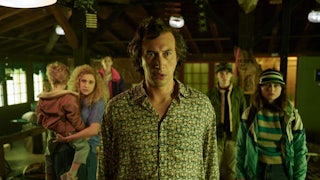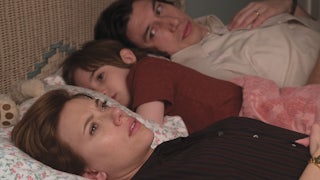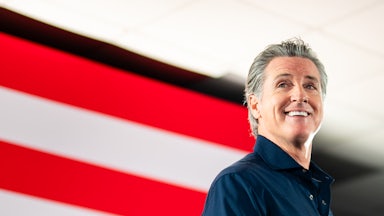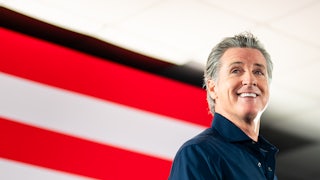Noah Baumbach first made a name for himself 30 years ago, writing and directing intelligent dark comedies about sad boys and angry men staring down the barrel of adulthood and all the difficulties that come with it: failure, resentment, isolation, remorse, aging, irrelevance, and death. In this respect, his latest film, Jay Kelly, presents more of the same, as Hollywood icon George Clooney hams it up in a thinly veiled performance of himself, glancing back at his own life beneath Sharpie-dark eyebrows. In the light of a Tuscan summer, he looks like Marcello Mastroianni if Federico Fellini had shot 8½ in color. From the portraits of Mastroianni and his frequent co-star Sophia Loren, pinned up around Jay’s green room in the film’s penultimate scene, it’s easy to conclude that the homage is self-conscious.
Baumbach has long borne the influence of other filmmakers with apparent satisfaction: Since his earliest work, he has drawn on Éric Rohmer (his eldest son’s namesake), Woody Allen, and Ingmar Bergman, and he still has not shaken comparisons to contemporaries Whit Stillman and Wes Anderson, an occasional collaborator. In its better moments, Jay Kelly’s overlapping fast talk and half-checked sentimentality call to mind Robert Altman; in its worst, Robert Zemeckis. As the son of two film critics, Baumbach pairs cinephilia with literary sensibility in a voice that has been, from the beginning, verbose and referential. Clooney’s suave delivery of ambitious mouthfuls in films by Anderson, Steven Soderbergh, and the Coen brothers, in particular, is a perfect fit for Baumbach, who has earned his reputation as an actor’s director. The star-studded cast of Jay Kelly is a far cry from the company of journeyman actors he directed in his youth, but Baumbach hasn’t stopped writing for the ensemble: Here, Billy Crudup, Patrick Wilson, Isla Fisher, Riley Keough, and Emily Mortimer, who co-wrote the screenplay, join the more familiar veterans of Baumbach’s recent work, including Adam Sandler, Laura Dern, and collaborator Greta Gerwig, to whom he is married.
Still, more than anything, Jay Kelly is a George Clooney movie. For one, it’s almost impossible to imagine anyone else playing the title role: a solitary man who has built his empire on charisma more than talent, floating wanly toward Olympus as his friends, family, and lackeys walk away relieved. Maybe Brad Pitt could have done it, had his temples been a little more preternaturally gray. Clooney reportedly accepted the part immediately, only expressing reservations about a man of his age filming the number of takes for which Baumbach is notorious—a 28-second bathroom sequence in Frances Ha required an excessive 42—an insecurity that the director worked, ironically, into the script. Baumbach opens his film with the finale of another, behind the scenes: When the camera rolls, the star, in character, comforts his dog while cradling a fatal bullet wound. It should be a wrap, but Jay insists on another try; the director talks him out of it.
In a flashback later on, Baumbach himself luridly encourages an aroused, younger Jay to give the sex scene they are shooting one more go. Were it not for this extra take, Jay admits in one of several George Bailey–esque soliloquies, he may not have abandoned his wife and infant child for his co-star, Daphne (Eve Hewson). That take, Baumbach implies, might have precluded the possibility of self-actualization, the life of a family man, or lasting peace. But the alternative—artistic resolve, ethical restraint—would have been bad for business: as it goes in Hollywood, career suicide.
The cost of fame is the central tension of Baumbach’s film: whether it is better to claim one’s place in the dramatic pantheon or to be a faithful husband and a present father. This is a tightrope that Adam Driver’s Charlie Barber walked gingerly in Marriage Story, an obvious fictionalization of Baumbach’s divorce from Jennifer Jason Leigh. But whereas Charlie’s domestic failings are tempered by an unerring commitment to art—his theatre company in New York is the family that comes first—Jay’s passion for the limelight, dimmed by time, is wavering.
Jay owes his initial success to the misfortune of his then-roommate, Timothy (Billy Crudup), who flubbed his audition for a movie called Cranberry Street; Jay got the part instead. Decades later, the wound is still raw, and when the two old friends reunite—at Chez Jay, the Beach Boys’ haunt in Santa Monica—after the funeral of the director, Peter Schneider (Jim Broadbent), Timothy’s tearful rendition of the menu (“Truffle parmesan fries … wedge of iceberg lettuce … shrimp cocktail”) makes clear which actor really deserved the role. Eventually Timothy, now a child therapist, confesses to despising Jay, and the two come to blows in the parking lot.
It is for this reason, perhaps, that a black-eyed Jay assembles his staff at his mansion in the Hills the next morning, announcing that he intends to back out of his next project and stalk his youngest daughter, Daisy (Grace Edwards), through her grand tour of Europe instead, in the hope that she will accompany him to accept an award in Italy that he had previously declined. The emergency meeting forces Ron Sukenick (Adam Sandler), Jay’s right-hand man, to forfeit a father-daughter tennis match; the consequences of Ron’s professional loyalty plague him across the Atlantic, and his daughter’s mysterious foot swelling seems to mirror the trauma that Jay’s eldest, Jessie (Riley Keough), has undergone due to her own father’s absence.
Ron does his best to talk “Puppy,” as he calls Jay, out of it: “You walking alone through Europe is like a gazelle walking through the Serengeti, but not a gazelle, a cocker spaniel,” he admonishes. Still, the team dutifully boards Jay’s private jet, their oblivious employer crooning “We’re Going to Paris” astride a piano. The publicist, Liz (Laura Dern, playing a toned-down version of the divorce lawyer she perfected in Marriage Story), provides a voice of reason, tempting Ron to quit working for Jay. She’s Ron’s former girlfriend, we learn; his obeisance to their mutual client ruined their engagement, at the Eiffel Tower of all places. Once again, Ron can’t muster the determination to stop working, and their rom-com reunion fizzles out with a kiss goodbye. “Save yourself,” she tells him, but Ron is a husband and father now, and he knows enough to avoid repeating Jay’s mistakes: His family depends on him, and so does his best friend.
Are they friends, though? Ron certainly thinks so, and Jay appears to confirm as much, but only to the extent that one man’s business is performing fealty and the other’s is feigning sincerity. Sandler’s earnest portrayal, stripped of the manic outbursts that proliferate in even his serious roles, elevates this subplot to the film’s emotional core. Those of us who fail to identify with a megarich deadbeat will likely find it harder to resist feeling for a working man, however well compensated, who dreads saying “no” to an over-demanding boss.
Jay’s daughters too are victims of his success. While Daisy eludes detection by paparazzi aboard the train to Italy, her dad does not (his pseudonym, when met by a chauffeur upon arrival, is “Caterpillar Brown”), and Baumbach relies on starstruck recognition from fellow passengers to cement the leading man’s esteem in the Hollywood economy of the film. His heroism in saving an elderly woman’s handbag from thieves upends the potential tabloid scandal of his brawl with Timothy, but the bitter discovery that the German cyclist (Lars Eidinger) who snatched it was in the midst of an under-medicated psychotic episode reveals to Jay that life is not an action movie, and in this script, he is just an average Joe, drowning in credit from all but his loved ones. When Jay’s life flashes before his eyes in the Italian cinema, what he sees is Clooney’s highlights reel: moments from The Thin Red Line; Goodnight, and Good Luck; Michael Clayton; and more. Can these performances seriously merit loves lost, or real human pain? Jay’s famous last words—“Can I go again? I’d like another one”—suggest reservations.
Jay Kelly marks a new stage—commercially ambitious, artistically lightweight—in Baumbach’s filmography. Would Jay have been better off—happier—struggling in obscurity, playing house? It’s hard to say. But for Baumbach, whose prestige is the result of swinging big in a small market, it can’t be too late to scale back and embrace his strengths. This tale of hubris that leads the protagonist to derail his chances at personal fulfillment in favor of universal adoration and monumental wealth could be an exercise in critical self-analysis—no question, Baumbach’s done it before. But Jay Kelly, a minor film with delusions of grandeur, lacks the unvarnished middle-aged pathos of Greenberg or the raw emotion of Marriage Story. Playing back his own reel, Baumbach may very well see progress, even continuity, in his climb toward A-list budgets. Success is a hell of a drug, after all.






